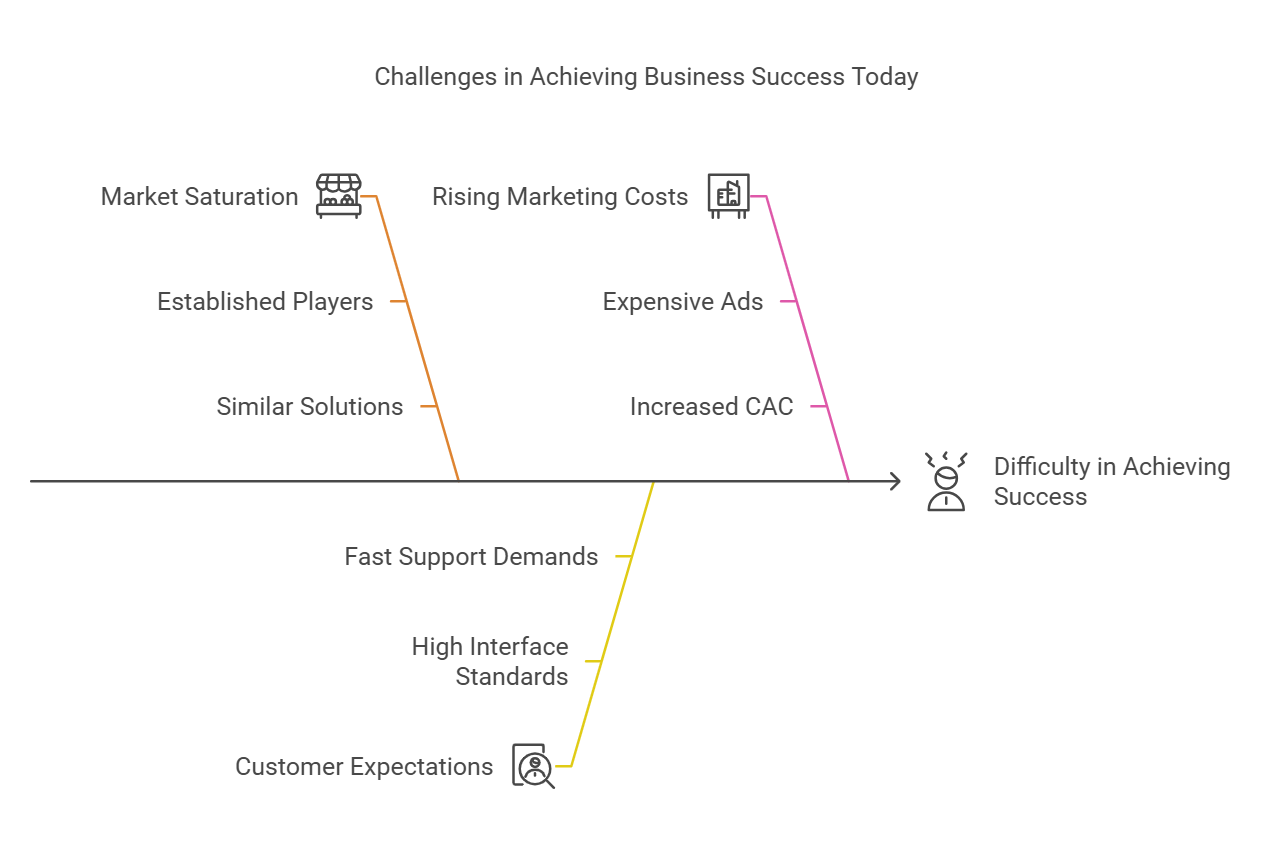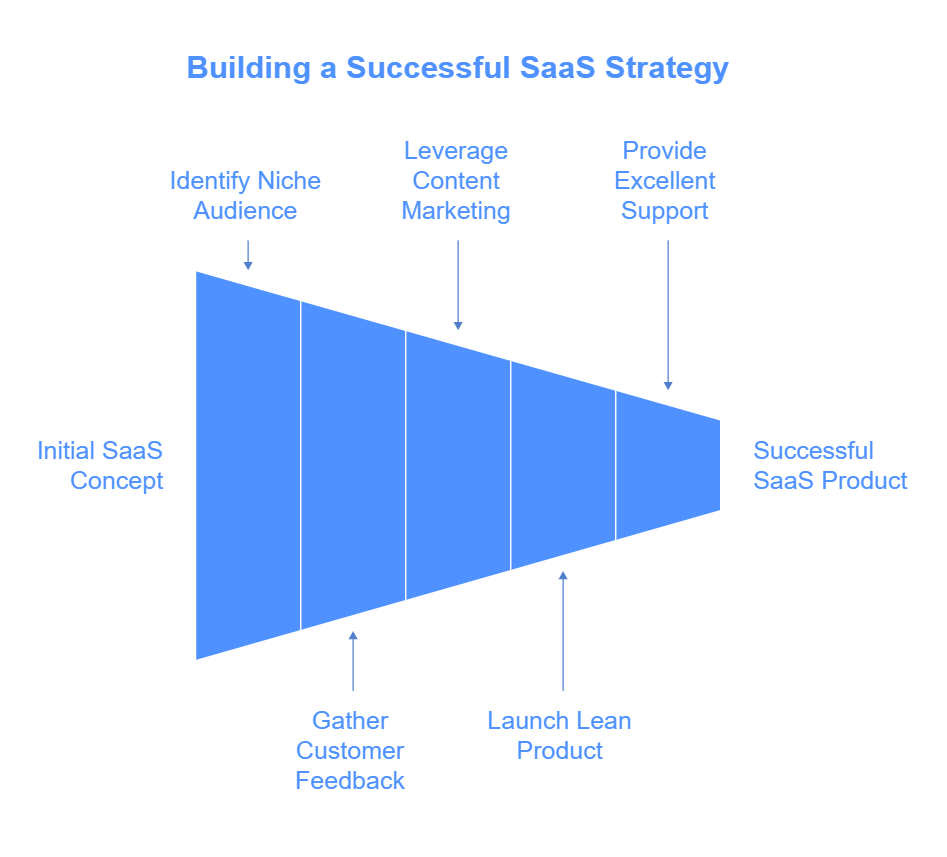Why Starting a SaaS Is Easier Than Ever but Succeeding Is Harder Than Before

Starting a SaaS business today is ridiculously easy. With no-code tools, templates, and AI-powered platforms, you can go from idea to prototype in days—sometimes even hours.
Heck, I built my SaaS using a no-code platform (Fuzen.io), and it saved me months of work.
But here’s the thing: while starting is easier than ever, succeeding has never been harder.
Let me explain why.
The Tools Have Leveled the Playing Field
No-code platforms, cloud hosting, and APIs have lowered the barriers to entry. You no longer need a team of developers or a massive budget to build an MVP. Tools like Zapier, Bubble, and Fuzen make it possible for solo founders to launch fully functional apps without writing a single line of code.
But this ease of entry comes with a downside—competition is fierce. In 2023, over 30,000 SaaS businesses were launched worldwide. That’s a staggering number, and it’s only growing.
The Real Challenge: Standing Out
When I launched my SaaS, I quickly realized that building the product was just step one. The real work started afterward—getting noticed.
With thousands of SaaS tools popping up every year, cutting through the noise is tough.
Here’s why it’s harder to succeed today:
-
Market Saturation
Almost every niche already has established players. Even if your idea is unique, chances are there’s already someone solving a similar problem. -
Customer Expectations Are Sky-High
Users expect polished interfaces, seamless onboarding, and lightning-fast support from day one. A survey by Zendesk found that 76% of customers stop using a product after just one bad experience. -
Marketing Costs Are Rising
With platforms like Google Ads and Facebook becoming saturated, customer acquisition costs (CAC) have skyrocketed. According to ProfitWell, CAC for SaaS companies has increased by 60% over the last five years.

How to Beat the Odds
I won’t sugarcoat it—it’s tough. But tough doesn’t mean impossible.
Here are some lessons I learned that might help:
-
Focus on a Niche Audience
Instead of trying to be everything for everyone, find a narrow niche and dominate it. My SaaS started by solving a very specific problem for small marketing teams, and that focus helped me gain traction quickly. -
Talk to Your Customers
Early feedback is gold. Before I even wrote my first line of logic, I talked to potential users. Their input shaped my product and saved me from building features no one wanted. -
Leverage Content and Community
Paid ads are expensive, but building relationships isn’t. I started sharing my journey (mistakes and all) on social media and Indie Hackers. This not only built trust but also created a small but engaged audience that supported my launch. -
Keep It Lean and Flexible
Don’t aim for perfection. Launch with a minimal version, gather feedback, and improve. Reid Hoffman’s famous quote sums it up: “If you’re not embarrassed by the first version of your product, you’ve launched too late.” -
Provide Ridiculously Good Support
In a crowded market, great customer support can set you apart. A report by HubSpot found that 93% of customers are likely to make repeat purchases with companies that offer excellent customer service.

The Stats Don’t Lie
- Only 10% of SaaS startups survive beyond 5 years. (Source: McKinsey)
- The average SaaS churn rate is around 5% per month. (Source: Baremetrics)
- Freemium models convert just 2-5% of users into paying customers. (Source: OpenView)
Why It’s Still Worth It
Despite the challenges, building a SaaS has been one of the most rewarding experiences of my life. Watching people use something I built to solve real problems is incredibly fulfilling.
Yes, the competition is fierce, and the bar for success is higher than ever. But the tools and resources we have today make entrepreneurship more accessible than it’s ever been. You can test ideas quickly, pivot easily, and scale faster.
Final Thoughts
Starting a SaaS today is like entering a crowded marathon. You need grit, strategy, and a lot of patience.
The good news? The finish line is worth it.
If you’re thinking about launching your own SaaS, start small, stay focused, and don’t be afraid to fail. And if you’re already in the game, keep pushing. Success isn’t just about having a great product—it’s about persistence.
What about you? Are you building a SaaS, or thinking about starting one? Share your story below—I’d love to hear it!

This post really resonates, Pushkar! The ease of starting a SaaS today is incredible, thanks to no-code platforms and AI tools. Working with Sitebot, I can relate to how these advancements empower businesses—big or small—to launch AI-powered solutions, like chatbots, without requiring extensive technical expertise or resources. However, as you pointed out, the real challenge is standing out in a crowded market and delivering true value to customers. The key is to stay focused, prioritize customer feedback, and continuously adapt to their needs. Persistence and creating meaningful, long-term solutions are what drive success.
You're absolutely right, Sonu! The ease of building with no-code is amazing. However, standing out is the real challenge.
True!
the competition nowadays is so high in every branch :(
the thing is that to be succesfull must go out of the box, thats what 90% of people is not capable to do
The competition in every field is incredibly fierce these days.
To truly stand out, you need to think outside the box. Unfortunately, many people get stuck in conventional thinking and struggle to come up with truly innovative solutions.
found your section about finding a niche helpful!
until you find a niche and tap into it, i've found it hard to make sense of that advice. but i'm just starting to find it with my current project (Foundation), and it really does make it feel true. my product is a place to find blogs and essays written by founders and technologists and it's resonating with those people (here and on X/twitter).
i also think it's hard advice to follow initially because no matter what targets you choose market to, you probably go a while without enough feedback to make you feel like you should double down which makes it tempting to move on.
thanks for the thoughts!
That's fantastic! I'm glad you're finding the advice about finding a niche helpful.
I aggree with U
Starting a SaaS business is easier than ever due to accessible cloud infrastructure, no-code/low-code tools, and widespread developer resources, reducing technical barriers and startup costs. However, succeeding is harder due to intense competition, market saturation, and high customer expectations for innovative features, seamless user experience, and reliable support. Standing out now requires not just building a product but excelling at differentiation, marketing, and customer retention.
AI and no-code tools have made the building process much easier now. But people especially founders have found out that the real hard part is not building a product.
It's always been solving a need for a specific group of people and finding a way to put it in the hands of people who can and want to buy.
You're absolutely right. AI and no-code tools have undeniably lowered the barrier to entry for building software, but the real challenge remains the same: identifying a genuine need within a specific market and effectively reaching the right audience.
Thank you ! Very good, motivating article.
Thank you:)
Finding a product that actually solves a real issue, is the key
It's easy to sell water for a thirsty person trapped in the desert
You're correct! It's all about finding a problem that truly needs solving.
Product market fit is key!
Product-market fit is absolutely critical. It's not just about having a good product, but having a product that the market actually wants and needs.
Absolutely love this article! It's so true that while no-code tools have made it easier than ever to launch a SaaS, the competition is fierce.
I also really resonate with your point about focusing on a niche audience. When I first started out, I tried to build a product that appealed to everyone, and it totally flopped. Once I narrowed my target market, things really started to take off.
That's fantastic! I'm glad you found the article helpful and that you've had a similar experience with focusing on a niche.
It can be tempting to try and build something for everyone, but as you've discovered, specializing often leads to greater success.
Yes you are 100% right ! I am totally agree with you because I know that AI have made it quite easy to build websites related to any topic and we can also make small tools by getting coding from AI sources,,, but ,,,, but the site building and tool building is not real success, any one can do this... To run the business online successfully is really tough and time taking work... Google algorithms have make it quite difficult to rank business related or other websites on serp.... We need a very well organized and very unique, not only unique but very very unique setup to run the business...
Absolutely! AI has made building websites and tools easier, but true success comes from strategy, persistence, and adapting to ever-changing algorithms. A unique and well-optimized approach is key to standing out in the digital space!
Starting a SaaS business is more accessible than ever thanks to advancements in technology, cloud infrastructure, and low-cost development tools. Entrepreneurs can now launch a SaaS product with minimal upfront investment, making it easier to enter the market. However, the real challenge lies in standing out in an increasingly crowded space. With so many SaaS companies emerging, competition is fierce. Success requires not only a great product but also effective marketing, customer retention strategies, and continuous innovation. It’s a tough journey, but with the right approach, it’s possible to thrive in this dynamic industry.
For more insights on launching a successful SaaS business, check out BetterJoy.
Well said! Launching a SaaS business is easier than ever, but standing out requires smart marketing, strong customer retention, and constant innovation. It’s a competitive game, but the right strategy can make all the difference!
looks like ai generated
This is such a spot-on breakdown of the current SaaS landscape. The mix of opportunity and challenges you describe really resonates. Focusing on a niche and building strong customer relationships feels more important than ever.
You're right!
Focusing on a niche and building strong customer relationships is key to success in today's competitive SaaS market.
Starting a Software-as-a-Service (SaaS) business has become more accessible than ever due to advancements in technology and widespread availability of resources. However, succeeding in the highly competitive SaaS landscape remains a significant challenge. Here's why:
---
### Why Starting a SaaS Is Easier Than Ever
Low-Cost Tools and Infrastructure
Developer-Friendly Ecosystem
Widespread Knowledge and Education
Global Market Access
Affordable Distribution Channels
---
### Why Succeeding Is Harder Than Before
Intense Competition
Customer Expectations Are Higher
Rising Customer Acquisition Costs (CAC)
Complex Market Dynamics
Retention Over Acquisition
Scaling Challenges
---
### How to Navigate the Challenges
In short, starting a SaaS has never been more accessible, thanks to advances in technology and resources. However, the ease of entry has increased competition and raised the bar for what’s required to succeed. A well-executed strategy focused on differentiation, customer satisfaction, and scalability is essential for long-term success.
This is a well-structured and insightful breakdown of the SaaS landscape! While launching a SaaS business is more accessible than ever, true success comes from differentiation, retention, and long-term scalability. The key is balancing innovation with strong execution. Great insights!